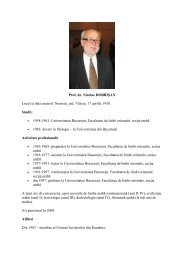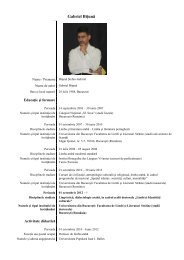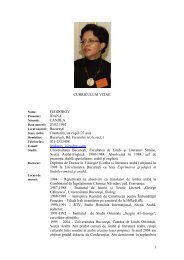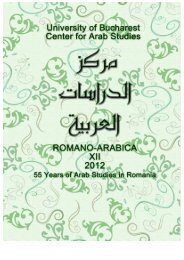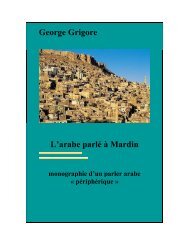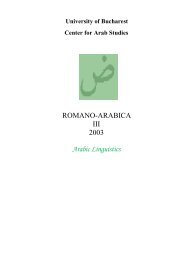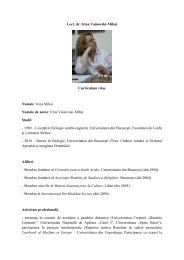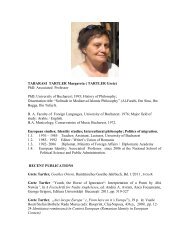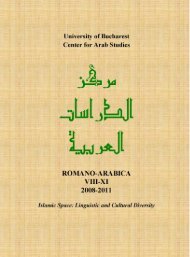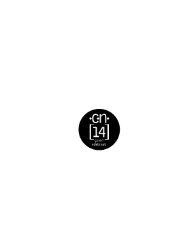University of Bucharest
University of Bucharest
University of Bucharest
You also want an ePaper? Increase the reach of your titles
YUMPU automatically turns print PDFs into web optimized ePapers that Google loves.
‗Abbās H}urayzāwī, a contemporary poet and a native <strong>of</strong> Sūsangard, does in his<br />
mis}rā‗: 30<br />
… // Yā s}āh}bi čarh~ iz-zimān ib-dōr.<br />
‗Oh my companion, the wheel <strong>of</strong> time is in rotation‘.<br />
The Persian word čarh~ meaning ‗wheel, fortune, fate‘ 31 is put in a<br />
construct state where it retains its original meaning. This word also appears in<br />
Iraqi Arabic, even though there is confusion as to what it exactly means there. In<br />
his dictionary on the foreign loans in spoken Baġdādī, Majīd Muh}ammad gives<br />
čarih~ in the meaning ‗hurry‘, and čarh~ala in the meaning ‗a walk‘, so it bears a<br />
slightly different meaning. 32 For both words he nevertheless gives Persian as<br />
origin, but in Persian none <strong>of</strong> the two meanings can actually be found. The Iraqi<br />
Arabic dictionary <strong>of</strong> Woodhead-Beene, on the other hand, mentions čarih~ (Pl.<br />
čurūh~) as ‗wheel‘ and čarh~ala (Pl. -āt) as ‗spin, turn, revolution‘. 33<br />
4. Conclusions<br />
During the analysis <strong>of</strong> the poems it occurred to me that the motive for the<br />
use <strong>of</strong> classicisms and other non-dialectal forms may as well have metrical<br />
reasons. This can be the case when dialectal short vowels were substituted for<br />
classical long ones. But poetry as a genre requires to some extent a language close<br />
to literary Arabic given the eloquence <strong>of</strong> the speech and the sublimity <strong>of</strong> the<br />
subject matter. Having this in mind, one should be cautious about trying to define<br />
the characteristics <strong>of</strong> a dialect reflected in the texts. Moreover, the poets<br />
themselves could have introduced literary forms as hypercorrections because<br />
these give a better expression to the purport <strong>of</strong> their message.<br />
From the features <strong>of</strong> the ‗Amāra-variety <strong>of</strong> H~ūzistāni Arabic discussed<br />
previously, one is certainly not to be found in the corpus. The letter jīm is in every<br />
case written in its regular form (ج), though its pronunciation should be a voiced<br />
postalveolar fricative /ž/. In view <strong>of</strong> the fact that other sounds alien to Classical<br />
Arabic are written with the letters borrowed from Persian (g as گ and č as چ), one<br />
may expect the letter ژ to be used for /ž/. Whereas throughout Iraq, the /g/ and /č/<br />
30<br />
Pūr-Kāz}im 1378/1999, 473-474.<br />
31<br />
Dihh~udā 1377/1998, 8100-8102.<br />
32<br />
Muh}ammad 1990, 126-127.<br />
33<br />
The dictionary even gives a verbal form čirah~ ‗to turn on a lathe‘ as the basic word, from which<br />
the other ones are derived, see Woodhead-Beene 1967, 84.<br />
48



